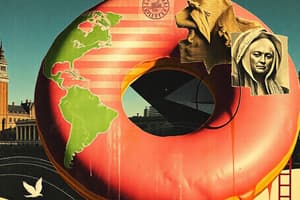Podcast
Questions and Answers
An increase in productivity of labor led to greater efficiency, contributing to increases in total national output and ______.
An increase in productivity of labor led to greater efficiency, contributing to increases in total national output and ______.
income
Free trade can expand the market of potential consumers, allowing for more ______ and higher levels of output.
Free trade can expand the market of potential consumers, allowing for more ______ and higher levels of output.
specialization
Owners of firms are incentivized to introduce the latest machinery to increase ______ and profits.
Owners of firms are incentivized to introduce the latest machinery to increase ______ and profits.
efficiency
The sources of expanding economic wealth include physical capital, technological progress, specialization of labor, and ______.
The sources of expanding economic wealth include physical capital, technological progress, specialization of labor, and ______.
Signup and view all the answers
Thomas Robert Malthus proposed that population growth tends to outpace ______ production.
Thomas Robert Malthus proposed that population growth tends to outpace ______ production.
Signup and view all the answers
According to Malthus, population would grow when average incomes rose above the level necessary for ______.
According to Malthus, population would grow when average incomes rose above the level necessary for ______.
Signup and view all the answers
Malthus argued that the ultimate limit on population expansion is the inability of the land to produce sufficient ______.
Malthus argued that the ultimate limit on population expansion is the inability of the land to produce sufficient ______.
Signup and view all the answers
Unrestricted exchange between countries will increase total world output if each country specializes in those goods it can produce at a relatively lower ______ compared to its potential trading partners.
Unrestricted exchange between countries will increase total world output if each country specializes in those goods it can produce at a relatively lower ______ compared to its potential trading partners.
Signup and view all the answers
In Malthus's view, agricultural output increases in ______ progression, while population increases in geometric progression.
In Malthus's view, agricultural output increases in ______ progression, while population increases in geometric progression.
Signup and view all the answers
Opportunity Cost - Ricardo focused on the international trade-off in production of one good for the other, that is, on the internal opportunity cost of production within each country for one unit of each good in terms of how much of the other must be ______.
Opportunity Cost - Ricardo focused on the international trade-off in production of one good for the other, that is, on the internal opportunity cost of production within each country for one unit of each good in terms of how much of the other must be ______.
Signup and view all the answers
Ricardo recognized that what was important in determining what each country should produce for trade was the relative cost of producing each good within individual countries, not the absolute ______.
Ricardo recognized that what was important in determining what each country should produce for trade was the relative cost of producing each good within individual countries, not the absolute ______.
Signup and view all the answers
When countries specialize and trade with one another, each country will be able to consume outside its own production possibilities ______.
When countries specialize and trade with one another, each country will be able to consume outside its own production possibilities ______.
Signup and view all the answers
It is only necessary to shift resources toward the goods that can be produced at a relatively lower opportunity ______.
It is only necessary to shift resources toward the goods that can be produced at a relatively lower opportunity ______.
Signup and view all the answers
Specialization in production and free trade is the best policy for countries to follow as it increases world ______ and the consumption possibilities for each country.
Specialization in production and free trade is the best policy for countries to follow as it increases world ______ and the consumption possibilities for each country.
Signup and view all the answers
It is the shift toward greater efficiency in the use of inputs that increases total world ______.
It is the shift toward greater efficiency in the use of inputs that increases total world ______.
Signup and view all the answers
Equilibrium would be achieved when the population grew again at a pace consistent with increase in ______.
Equilibrium would be achieved when the population grew again at a pace consistent with increase in ______.
Signup and view all the answers
Malthus’ theory predicts a 'vicious circle of ______' where equilibrium level of income per person is subsistence only.
Malthus’ theory predicts a 'vicious circle of ______' where equilibrium level of income per person is subsistence only.
Signup and view all the answers
Two types of checks that balance population with resources are Positive Checks and ______ Checks.
Two types of checks that balance population with resources are Positive Checks and ______ Checks.
Signup and view all the answers
Positive Checks include increased death rates through war, ______, natural catastrophes, and starvation.
Positive Checks include increased death rates through war, ______, natural catastrophes, and starvation.
Signup and view all the answers
Acts of charity might lead to a decrease in the willingness of the poor to work by diminishing their fear of ______.
Acts of charity might lead to a decrease in the willingness of the poor to work by diminishing their fear of ______.
Signup and view all the answers
The Agricultural Revolution resulted in increased food output and higher living standards with ______ effort.
The Agricultural Revolution resulted in increased food output and higher living standards with ______ effort.
Signup and view all the answers
David Ricardo advocated for free trade to enhance global ______.
David Ricardo advocated for free trade to enhance global ______.
Signup and view all the answers
When economic growth occurs, land of lower productivity is brought into use, referred to as ______ land.
When economic growth occurs, land of lower productivity is brought into use, referred to as ______ land.
Signup and view all the answers
In the traditional society stage, society remains predominantly ______.
In the traditional society stage, society remains predominantly ______.
Signup and view all the answers
The preconditions to take-off involve the destruction of ______ society.
The preconditions to take-off involve the destruction of ______ society.
Signup and view all the answers
Reactive nationalism leads to the creation of modern businesses utilizing ______ methods of production.
Reactive nationalism leads to the creation of modern businesses utilizing ______ methods of production.
Signup and view all the answers
Take-off into sustained growth requires a rise in the rate of productive ______.
Take-off into sustained growth requires a rise in the rate of productive ______.
Signup and view all the answers
The development of one or more substantial manufacturing ______ is necessary during the take-off stage.
The development of one or more substantial manufacturing ______ is necessary during the take-off stage.
Signup and view all the answers
Stages 4 and 5 pertain to maturity and age of mass ______.
Stages 4 and 5 pertain to maturity and age of mass ______.
Signup and view all the answers
In the maturity phase, the economy becomes ______ and technologically sophisticated.
In the maturity phase, the economy becomes ______ and technologically sophisticated.
Signup and view all the answers
In the age of mass consumption, the focus shifts towards production for ______, with limited concern for building further production capabilities.
In the age of mass consumption, the focus shifts towards production for ______, with limited concern for building further production capabilities.
Signup and view all the answers
An increase in the savings rate will increase the growth rate of the economy ceteris ______
An increase in the savings rate will increase the growth rate of the economy ceteris ______
Signup and view all the answers
Higher levels of investment create higher ______ levels
Higher levels of investment create higher ______ levels
Signup and view all the answers
If output grows faster than the ______ rate, the growth rate of output will increase even more
If output grows faster than the ______ rate, the growth rate of output will increase even more
Signup and view all the answers
The Knife-Edge Equilibrium refers to the delicate balance between ______ and growth rates
The Knife-Edge Equilibrium refers to the delicate balance between ______ and growth rates
Signup and view all the answers
Without the right savings rate, the Harrod-Domar analysis predicted alternative abysses of either self-perpetuating inflation or spiralling ______
Without the right savings rate, the Harrod-Domar analysis predicted alternative abysses of either self-perpetuating inflation or spiralling ______
Signup and view all the answers
Keynesian economics argues that central government intervention is necessary to approach full-employment ______
Keynesian economics argues that central government intervention is necessary to approach full-employment ______
Signup and view all the answers
Keynesians rejected the laissez-faire, full-employment assumption of classical ______
Keynesians rejected the laissez-faire, full-employment assumption of classical ______
Signup and view all the answers
Without government oversight, inflation or ______ were as likely to result as a fully employed economy
Without government oversight, inflation or ______ were as likely to result as a fully employed economy
Signup and view all the answers
Manuel's refusal to take the land offered by the state is understandable because it was far from his family and community, isolating him from social and economic support ______.
Manuel's refusal to take the land offered by the state is understandable because it was far from his family and community, isolating him from social and economic support ______.
Signup and view all the answers
Taking the land might have provided him with a modest starting point, but it failed to address his livelihood needs or align with his cultural and emotional ties to his ______ land.
Taking the land might have provided him with a modest starting point, but it failed to address his livelihood needs or align with his cultural and emotional ties to his ______ land.
Signup and view all the answers
Lucy could have sought collective action through unions or alliances with organizations like Nicole Harvey's ______.
Lucy could have sought collective action through unions or alliances with organizations like Nicole Harvey's ______.
Signup and view all the answers
Lucy appears most closely allied with Nicole Harvey's perspective on fair ______ and better labor conditions.
Lucy appears most closely allied with Nicole Harvey's perspective on fair ______ and better labor conditions.
Signup and view all the answers
Henry Copple’s claim that the problems experienced by Manuel and Lucy are just growing ______ lacks validity as it trivializes severe impacts.
Henry Copple’s claim that the problems experienced by Manuel and Lucy are just growing ______ lacks validity as it trivializes severe impacts.
Signup and view all the answers
Compensation should be comprehensive, including fair monetary payment that reflects the true value of the land and its cultural ______.
Compensation should be comprehensive, including fair monetary payment that reflects the true value of the land and its cultural ______.
Signup and view all the answers
It should also provide alternative ______, access to education, and housing within proximity to their community.
It should also provide alternative ______, access to education, and housing within proximity to their community.
Signup and view all the answers
These are not minor inconveniences but systemic issues that demand equitable and sustainable ______.
These are not minor inconveniences but systemic issues that demand equitable and sustainable ______.
Signup and view all the answers
Study Notes
Embedded Economy
- Nested within society and the living world
- Diverse ways to meet needs and wants (Raworth)
Doughnut Economy
- Safe and just space for humanity
- Between social foundation of well-being and ecological ceiling (Raworth)
Sustainability
- Meeting present needs without compromising future generations' ability (Brundtland Report)
- Defining development by economy's nestedness in society and environment (Giddings)
Relations of Globalization & Development
- Contested: Generates growth and integrates economies into global markets
- Exacerbates poverty and dictates global economic engagements (McCloskey)
- Problematizing institutional and ideological development instruments.
Problems Posed by TNCs
- Use capital to capture markets (core)
- Accelerate globalization
- Accountable only to stockholders
- Reflect trade rule capacities for gov'ts and markets benefitting private capital
- Low wages, labor exploitation
- Prevents unionization, relocates profits, breaches environment
- Develops political impunity
- Exercises immense political influence over national governments in WTO negotiations (McCloskey)
Internalizing Externalities
- Making parties responsible for external costs
- Corporations preventing environmental and societal costs in future
- Capital cannot replace lost community or natural resources (Giddings)
Economic Growth vs. Equity, Well-being, and Happiness
- Relationship complex
- Kuznets' inverted-U hypothesis: inequality begins and then decreases with growth (Kuznets)
- Pigou's dictum: changes in economic welfare often correlate with shifts in social welfare, possibly not to the same degree
- Beja's emphasis on subjective experience of poverty (Beja)
- Philippine Misery Index (PM1)
- Tan's modified Easterlin's hypothesis
- Sen's freedoms
Sen's Freedoms
- Freedom ultimate goal and primary means of development (Amartya Sen)
- Freedom encompasses political liberties and freedom from material deprivation
- Freedom empowers individuals to shape societies and economies
- Five distinct freedoms: Political, Economic, Social Opportunities, Transparency Guarantees, Protective Security
Classical (Smith, Malthus, Ricardo, Marx)
- Wealth and output production
- Wealth and competing groups' distribution
Neoclassical (Keynes)
- Scarce resource allocation for best use given institutions
- Focus on society's saving behaviors, and determinant variables
Developmentalist (Rosenstein-Rodan, Nurkse, Hirschman, Lewis, Rostow)
- Economic development possible for less developed countries
- Need for competitive market and responsive government -Loose school of thought on economic development for less developed countries
Heterodox (Prebisch, Singer, Ayres, Myrdal, Baran, and Cardoso)
- Changes in economic conditions may not be enough to create development
- Development may need to occur within existing frameworks
Economic Development
- Possibility for less developed countries in short timeframe
- Competitive markets and efficient government necessary
Studying That Suits You
Use AI to generate personalized quizzes and flashcards to suit your learning preferences.
Related Documents
Description
Explore the interconnected concepts of the embedded economy, doughnut economy, and sustainability. Understand the implications of globalization and development, along with the challenges posed by transnational corporations. This quiz examines key ideas and figures that shape our economic landscape.




